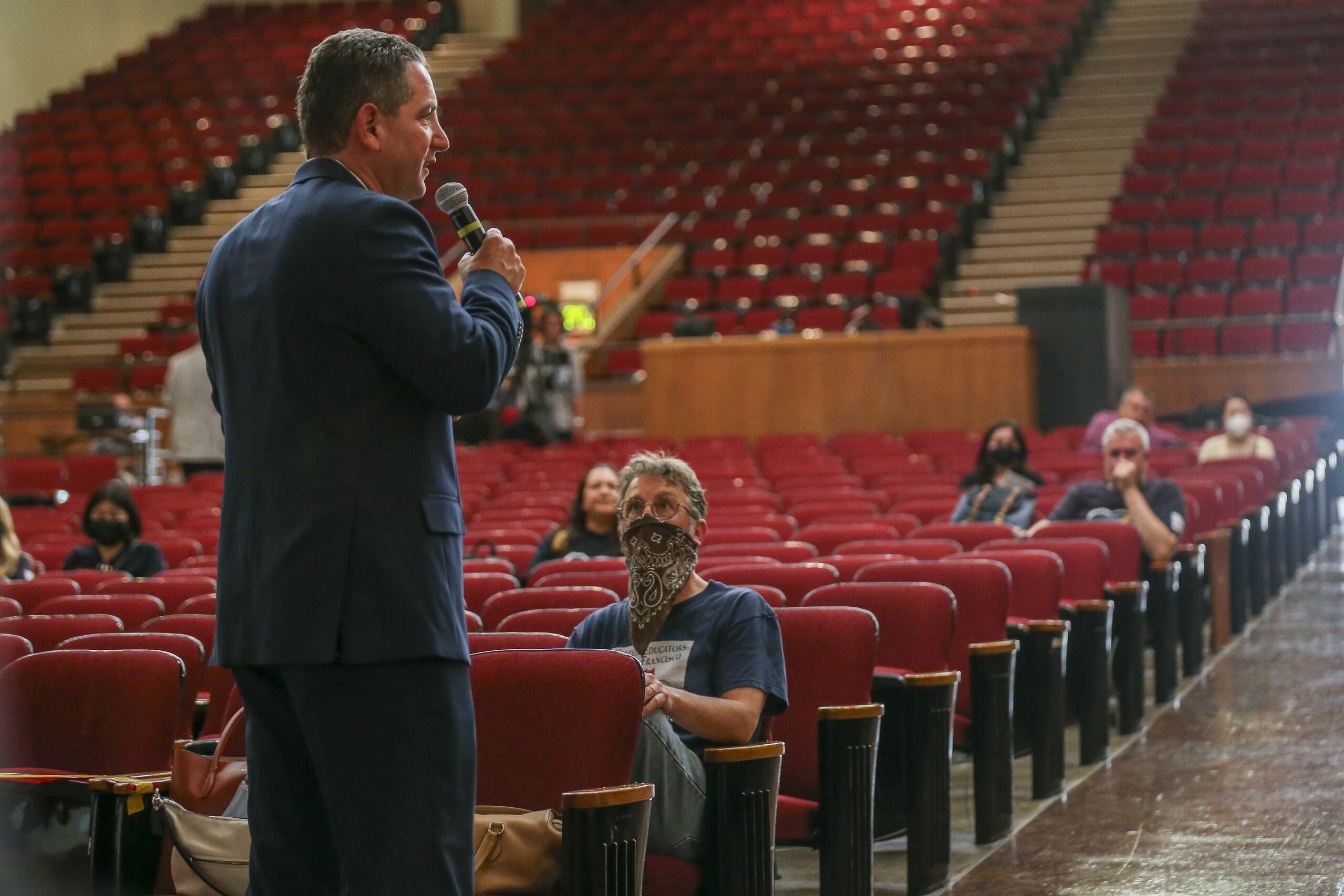Typical feedback given to San Francisco Unified School District goes something like this: people fill out a speaker card around the beginning of a school board meeting and have a minute or two to convey their thoughts, the emotions behind it, and call to action.
And because of the state’s open-meeting laws, which require advance notice for discussions about public business, the seven-member Board of Education is not allowed to respond.
That’s what makes an upcoming series of town halls unique. SFUSD constituents have a rare chance at several upcoming community meetings to have a two-way conversation with district leaders.
Superintendent Matt Wayne kicked off the first of four town halls this week, while the board will appear at a series of 11 meetings that start later this month.
At the first town hall with SFUSD’s new superintendent, which took place at Abraham Lincoln High School Thursday, attendance was low—with about 40 people in a large auditorium—but the conversation was candid and robust among parents, staff and Wayne.
It was the first of Wayne’s five-part “Listening and Learning” tour and it elicited plenty of feedback around good governance, curriculum, culture, operations and finance, district’s ability to meet the community’s needs.
Wayne started the meeting by explaining why he’s hosting the series.
“What I hear is such a strong commitment to the success of students in San Francisco,” he told the audience Thursday evening. “At the same time, I see there’s a lot of trust we need to rebuild in the community and rebuild with our staff in order for us to meet our goals.”
The conversation that followed was wide-ranging and touched on, among other things, ongoing staff payroll issues, school safety, math curriculum and stationing community organizations in schools. Parents and staff also asked about how to better incorporate student voices and involve parents struggling with socioeconomic issues and cultural and language barriers
“When my parents came from Nicaragua, they didn’t know nothing about how the school system worked,” said Oscar Pena, a parent who grew up in the Mission. “There’s a lot of parents that don’t know that. There needs to be more outreach from SFUSD to tell these people, inform them, what’s the pathway, what does that look like.”
Similar themes emerged when participants were invited to write additional comments on sticky notes.
“New teacher retention is a huge concern,” one read.
“How will we fund staffing to follow through on restorative justice practices?” another asked. “Without follow through, many issues with student behavior go unchecked.”
A cluster of four such notes raised concerns about student attendance and the impact of rising truancy on district funding. It noted how schools no longer have School Attendance Review Boards, which used to notify families if students skipped class and set clear expectations for support systems to address absenteeism.
Teachers primarily from George Washington High School also showed up Thursday with flyers for community members to flag ongoing issues around payroll and wages, which are under negotiation for the first time in years and, according to the teachers union interfering with staff retention.
“We want to be able to support our students the best possible,” said Sarita Lavin, who teaches ethnic studies and U.S. history at George Washington High. “Until teachers are paid, that’s not going to happen.”
The next superintendent town hall—which will be primarily in Cantonese and interpreted live—will be held at Galileo High School on Tuesday. That will be followed by one primarily held in Spanish at Mission High School on Thursday. The final event in the series is set for Oct. 4 at Willie L. Brown Jr. Middle High School. All start at 5 p.m., with programming scheduled from 5:30 to 7 p.m.
The Board of Education, meanwhile, starts the first of its 11 listening sessions on Sept. 19 at Lafayette Elementary School in Outer Richmond.
The public outreach will help shape new policy around how the school board fields public comment and structures its committee meetings. Committee meetings were paused over the summer so the school board could come up with a plan to improve governance after a tumultuous couple of years since the pandemic.
This past Tuesday, the school board unanimously approved revisions to its operating procedures that includes staff preparing meeting materials 12 days in advance and moving away from introducing resolutions that are often unenforced. Under the new rules, the board must also spend at least half of each meeting on topics directly related to student outcomes—as opposed to the 0-to-5% it now spends at a typical board meeting, according to a recent analysis.
More information on the superintendent’s town halls and the Board of Education listening tour can be found here.
